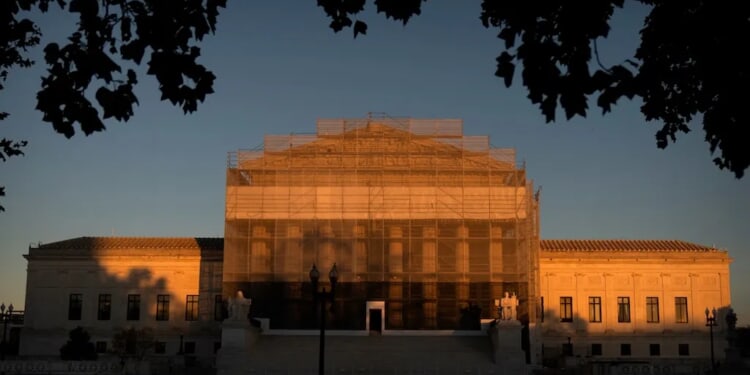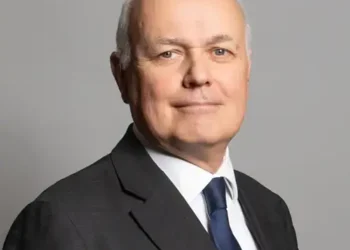President Donald Trump faced his first major policy test before the Supreme Court on Wednesday, with his tariffs under scrutiny. The case is the first of likely many where his emergency powers are under the microscope by the high court.
Trump cited declared emergencies over fentanyl and trade deficits to justify his tariffs under the International Emergency Economic Powers Act; however, the key question at the center of Wednesday’s arguments was whether IEEPA authorizes a tariff power for the president. Other declared emergencies are facing scrutiny in lower courts, including ones involving the use of the National Guard and the Alien Enemies Act.
Whether Trump alone gets to decide what counts as an “emergency,” which, under multiple laws, unlocks additional presidential powers, is poised to be a recurring issue in his future cases at the high court, as will be the question of whether, once an emergency is declared, the laws Trump cites actually give him the additional authorities he says they do.
Supreme Court tends to defer on emergency declarations
Typically, the high court gives significant deference to a president’s declared emergencies, opting usually to review whether statutes give presidential emergency power to invoke the actions under scrutiny. The most recent high-profile review of this was in the 2023 case Biden v. Nebraska over a bid to cancel billions of dollars of student loan debt via emergency powers.
The Supreme Court rejected former President Joe Biden’s attempt to use emergency powers in the Health and Economic Recovery Omnibus Emergency Solutions Act to cancel student loans in 2022, arguing the emergency powers he cited did not grant his administration that vast power.
“The Secretary [of Education] asserts that the HEROES Act grants him the authority to cancel $430 billion of student loan principal. It does not. We hold today that the Act allows the Secretary to ‘waive or modify’ existing statutory or regulatory provisions applicable to financial assistance programs under the Education Act, not to rewrite that statute from the ground up,” Chief Justice John Roberts wrote in the majority opinion for Biden v. Nebraska.
The 6-3 majority on the high court rejected the Biden administration’s interpretation that the provision of the HEROES Act gives them “virtually unlimited power to rewrite the Education Act,” and the idea offered by the dissent that the bill was “left deliberately vague because Congress intended ‘to grant substantial discretion to the Secretary to respond to unforeseen emergencies.’”
The emergency Biden invoked to justify using the HEROES Act was the COVID-19 pandemic. The court did not question the emergency itself.
Richard Pierce, a law professor at George Washington University, told the Washington Examiner that there have been “very few cases” where the high court has either reviewed or declined to review “direct presidential actions taken on the basis of an emergency” and said its current understanding of the issue will be key for whether many of Trump’s actions, such as tariffs and his use of the National Guard, ultimately survive court challenges.
“It really is terribly important to figure out how the current court is going to approach these many cases in which Trump is invoking his emergency powers,” Pierce said.
Tariffs under scrutiny now, but National Guard and immigration emergency actions could be next
Trump has invoked emergency powers in several areas, but the instances where they have gotten the most legal pushback include his tariffs, his use of the National Guard in cities to protect federal assets, and on immigration — specifically, his attempt to invoke the Alien Enemies Act.
Tariffs presented the first test of the president’s emergency powers at the high court, with the justices largely focusing on the powers in IEEPA. During the oral arguments, Justice Elena Kagan mentioned the question of reviewing emergency delectations when grilling Solicitor General D. John Sauer.
“You yourself think that the declaration of emergency is unreviewable. And even if it’s not unreviewable, it’s, of course, the kind of determination that this Court would grant considerable deference to the president on,” Kagan said, signaling the high court’s thinking on the matter.
She also alluded to the high number of declared emergencies by presidents in recent years, quipping that “it turns out we’re in emergencies, everything all the time about, like, half the world.”
While the high court may not release its decision on Trump’s tariffs case for several months, Pierce said he will be “looking very carefully” at the rationale to understand how the justices may view other presidential emergency power cases.
“Trump is, more than any president in history, relying on direct actions by the president under one of the 137 statutes that confer emergency power on the president,” Pierce told the Washington Examiner. “And so the big question there is, how is the court going to approach that whole big group of cases?”
“And how deferential will they be to the president in the context of all of these actions that he has taken based on his claim that he’s acting in an emergency?” he added. “I’m going to be looking very carefully at the reasoning in that opinion to try and figure out how the court is likely to address many other issues, which of course, will affect the power of the president to take many of the actions that he wants to take.”
The president’s attempt to invoke the Alien Enemies Act to deport alleged Venezuelan gang members quickly has been halted in federal courts across the country, with nearly every court rejecting the president’s determination of the “invasion or predatory incursion” necessary to use emergency powers under the 18th-century law.
The seldom-used law could be the subject of Supreme Court arguments in the coming terms, as cases over Trump’s invocation of it continue to move up through the federal court system.
Multiple lower courts have reviewed the president’s emergency deployment of the National Guard to cities amid unrest over federal immigration operations. Most federal district courts have rejected claims that the president is unable to uphold federal law with regular forces, so far striking down attempts to deploy the National Guard in Los Angeles, Portland, and Chicago. Only in Los Angeles has an appeals court overruled the lower court and allowed the troops to be deployed.
The Supreme Court may hear a full merits challenge to the president’s deployment of the National Guard to various cities in the near future, but it is already weighing an emergency docket petition on the matter.
The Justice Department has insisted in every court case that the president’s decision to deploy the National Guard is not reviewable by the judiciary under federal law, but nonetheless has had to petition the high court after a federal appeals court upheld an injunction blocking the deployment of troops to Chicago.
TRUMP MAY FINALLY GET SOME LOSSES AS SUPREME COURT TURNS TO MERITS DOCKET
The Supreme Court has asked for additional briefing on the request, meaning a decision in the petition is not expected until later this month at the earliest.
While emergency powers are a key question at the center of several likely Trump Supreme Court cases, there are a variety of regular actions that the high court could also review. The Supreme Court has already agreed to review Trump’s firing of a Democrat-appointed FTC commissioner, in a case that could have sweeping ramifications for the firing of independent agency heads, and has been asked to take up a case about Trump’s birthright citizenship order.
















